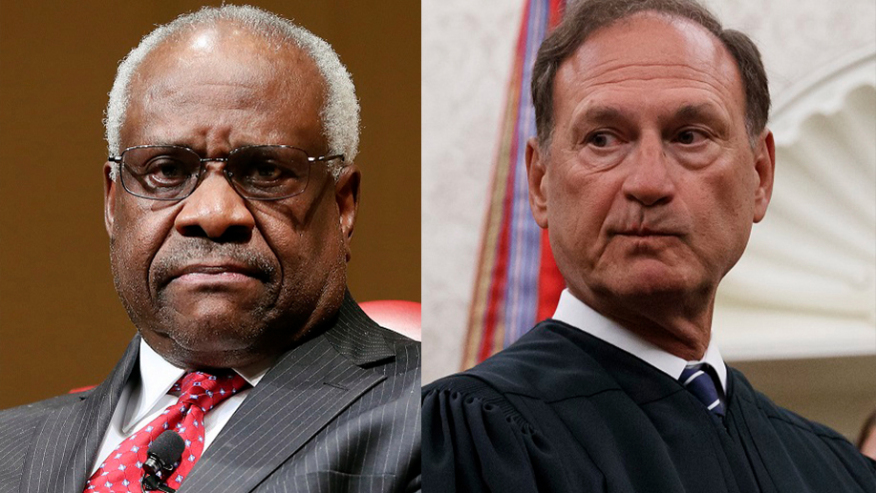Supreme Court justices threaten same-sex marriage rights
Pablo Martinez Monsivais, Carolyn Kaster
Thomas (left) and Alito (right) have been open about their disapproval of same-sex marriage.
November 15, 2020
In the wake of the appointment of Amy Coney Barrett to the U.S. Supreme Court, Justices Clarence Thomas and Samuel Alito have been outspoken in their desires to repeal Obergefell v. Hodges, the court case that legalized same-sex marriage in the U.S in 2015. With members of the LGBTQ+ community possessing the freedom for only five years, members of the government have already threatened to backpedal.
On Monday, Oct. 5, Justices Thomas and Alito agreed to not hear a case brought by a clerk in Kentucky who refused to issue marriage licenses for same-sex couples. The justices used the occasion to bash marriage equality as a whole.
The justices explained that they believed that the case of same-sex marriage should have been left to be decided by state legislatures and restricts the religious freedom of Catholics. Though not every Catholic is homophobic by any means, the Catholic church has been known to discourage same-sex relationships and declare sexual activity between the same sex a sin; recently, however, Pope Francis has approved of the union of same-sex couples. Thomas explained, “Obergefell enables courts and governments to brand religious adherents who believe that marriage is between one man and one woman as bigots, making their religious liberty concerns that much easier to dismiss.”
What the justices seem to be forgetting is the first clause of the Bill of Rights, which states that “Congress shall make no law respecting an establishment of religion.” Though the U.S. was established on Protestant principles, the federal government is affiliated with no official religion. Thomas and Alito are completely disregarding the separation of church and state, a precedent that has been set since its usage by Thomas Jefferson in 1802 in order to promote religious freedom and prevent personal beliefs from influencing government practices. The vast majority of the country has no problem with same-sex marriage, so the idea that the beliefs of roughly twenty percent of adult Americans should impact the lives of over three hundred million citizens is privileged and unreasonable.
If the same logic were applied to all religions that exist in the U.S., every American would lose access to everyday practices and food items that are forbidden in non-Catholic religions. For example, in Islam, consuming alcohol and pork is considered Haram. If Muslims were to demand the ban of these items due to their own beliefs, the country would quickly become a frenzy, yet when Catholics begin to discuss such things, it is considered normal, despite being an outrageous violation of freedom when it comes to the people being affected.
One of the main arguments used by those who are against marriage equality is that LGBTQ+ people choose their lifestyle. In reality, homosexuality is not a strictly human practice; it has been observed in over 450 species of animals, ranging from mammals and birds to reptiles and insects. According to studies from the Broad Institute of MIT and Harvard, genetics account for 18-25 percent of same-sex behavior. While there is no specific gene that determines one’s sexual orientation and genetics are not the only reason behind one’s sexual orientation, there have been traces of sexuality linked to the SLITRK6 gene, which is active in the region of the brain known as the diencephalon, whose size alters based on sexuality.
It is absurd to believe that homosexuality is chosen freely by an individual; such a statement is an insult to the centuries of endless torment, bullying, and stigmas geared toward those who weren’t practicing heterosexuals. According to The Trevor Project, homosexual youth are three times as likely to seriously contemplate suicide compared to heterosexual youth and are almost five times as likely to commit suicide. Children across the country lose friends, are kicked out of their homes, or even disowned by their parents for something they have no control over. Why would someone “choose” to live in a world where they often aren’t wanted or accepted?
Barrett, who was a trustee at a school for almost three years with anti-gay policies in place, is advancing citizens’ worries about the future of marriage equality. Like the school, Barrett and her husband have been longtime members of People of Praise, a community that considers same-sex relationships to be “an abomination against God.” Though Barrett’s exact stance on homosexuality is unknown and she has claimed that her religion will not impact her decisions in the courtroom, the thought of one-third of the Supreme Court being against marriage equality terrifies the LGBTQ+ community, as they worry for the future of their freedom.
Though such a drastic damper on freedom for such a vibrant and large group of U.S. citizens is unlikely and will not happen overnight, just the thought of marriage equality being overturned is enough to send chills down the spines of LGBTQ+ community members and allies alike. Contacting local Senators, spreading the word, and being supportive of any relationship regardless of sexuality is key in order for marriage to remain an option for all. The debate on marriage equality demonizes an innocent community that craves nothing but the acceptance of the public to love whom they choose.
